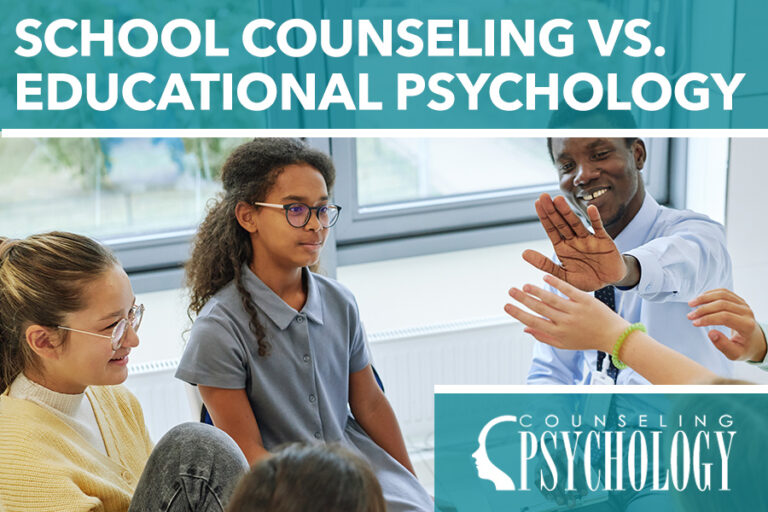School Counseling vs. Educational Psychology: Comparing Degrees and Career Paths

Education professionals who aspire to make a meaningful difference in students’ lives often find themselves weighing two distinct but complementary career paths: school counseling and educational psychology. While both fields focus on enhancing student well-being and academic success, they differ significantly in their approaches, required training, and professional roles.
This guide examines the key differences between School Counseling and Educational Psychology degrees, from curriculum content and practical training to career trajectories and salary expectations. Understanding these distinctions will help you align your educational investment with your professional goals and personal strengths.
Degree Overview: Foundations and Focus
School Counseling Degrees
School Counseling programs typically culminate in a master’s degree in school counseling (such as an M.Ed., M.A., or M.S.). These programs prepare graduates to provide direct counseling services to students in K-12 settings, addressing academic challenges, social-emotional development, and college/career planning.
The curriculum typically emphasizes:
- Counseling theories and techniques
- Group counseling methods
- Career development
- Assessment and testing
- Crisis intervention
- Multicultural counseling
- School-based consultation
Most programs require 48-60 credit hours and include supervised practicum and internship experiences in school settings, totaling 600-700 clinical hours.
Educational Psychology Degrees
Educational Psychology programs generally lead to a master’s degree in educational psychology, with many students continuing to a doctorate in educational psychology (Ph.D. or Ed.D.). These programs focus on understanding how people learn and applying psychological principles to improve educational outcomes.
The curriculum typically covers:
- Learning theories and cognitive development
- Research methods and statistics
- Educational assessment and measurement
- Motivation and learning
- Instructional design
- Human development
- Exceptional learners and special education
Master’s programs usually require 30-36 credit hours, with doctoral programs adding an additional 60+ credits, comprehensive exams, and dissertation research.
Side-by-Side Comparison: School Counseling vs. Educational Psychology
| Feature | School Counseling | Educational Psychology |
| Degree Types | M.Ed., M.A., or M.S. in School Counseling | M.A. or M.S. in Educational Psychology; Ph.D. or Ed.D. for advanced positions |
| Program Length | 2-3 years (master’s) | 1-2 years (master’s), 4-6 additional years (doctorate) |
| Credit Requirements | 48-60 credits | 30-36 credits (master’s), 60+ additional (doctorate) |
| Field Experience | 600-700 supervised hours in schools | Varies; research assistantships common; less direct service focus |
| Core Focus | Direct service delivery to students | Research, assessment, and program development |
| Certification/Licensure | School Counselor certification/license | Varies by career path; may require psychology licensing for some roles |
| Primary Work Settings | K-12 schools | Schools, universities, research institutions, testing companies, government agencies |
| Primary Role | Practitioner | Researcher/specialist |
| Career Flexibility | Somewhat specialized | Highly versatile |
Career Paths and Opportunities
Careers with a School Counseling Degree
- School Counselor: A school counselor works directly with K-12 students providing academic, career, and personal/social counseling. Requires state certification.
- Salary Range: $50,000-$90,000
- Job Outlook: 8% growth (faster than average)
- College Admissions Counselor: Guide students through the college application and selection process.
- Salary Range: $40,000-$65,000
- Career Counselor: Career counselors help individuals explore career options and make employment decisions.
- Salary Range: $45,000-$70,000
- Student Affairs Professional: Work in higher education supporting student success and development.
- Salary Range: $45,000-$80,000
- School-Based Therapeutic Counselor: Provide mental health services within school settings (may require additional licensure).
- Salary Range: $50,000-$75,000
Careers with an Educational Psychology Degree
- Educational Researcher: Conduct studies to improve educational practices and outcomes.
- Salary Range: $60,000-$100,000
- Educational Psychologist: An educational psychologist assesses students, consults with teachers and parents, and develops interventions (requires specialist-level training or doctorate in most states).
- Salary Range: $65,000-$115,000
- Job Outlook: 10% growth (faster than average)
- Curriculum Developer: Design educational materials and programs based on learning principles.
- Salary Range: $65,000-$95,000
- Educational Assessment Specialist: Create and evaluate tests and measurement tools for learning.
- Salary Range: $60,000-$90,000
- University Professor: Teach and conduct research in educational psychology (requires doctorate).
- Salary Range: $70,000-$150,000
- Educational Consultant: Advise schools, districts, or educational companies on evidence-based practices.
- Salary Range: $70,000-$120,000
Key Differences in Day-to-Day Work
School Counseling Professionals:
- Work directly with students most of the day
- Address immediate personal, social, and academic concerns
- Implement established programs and interventions
- Collaborate regularly with teachers and parents
- Focus on practical application of counseling techniques
- Engage in crisis response and management
Educational Psychology Professionals:
- Often divide time between research and application
- Focus on understanding learning processes and barriers
- Develop new programs and assessment methods
- Work on systemic improvements to educational practices
- Analyze data and evaluate program effectiveness
- May have less direct student contact in many roles
Choosing the Right Path: Self-Assessment Questions
Ask yourself these questions to determine which field might better suit your interests and career goals:
- Do you prefer direct service or research?
- If you enjoy one-on-one and small group work with students, school counseling may be a better fit.
- If you’re fascinated by understanding how learning works and developing better educational methods, educational psychology might align better.
- What degree timeline works for your career goals?
- School counseling typically requires a master’s degree for practice.
- Many advanced educational psychology positions require doctoral training.
- What work environment do you prefer?
- School counseling offers the stability of school-based employment.
- Educational psychology provides more diverse setting options, including corporate, government, and higher education.
- What aspects of education interest you most?
- If social-emotional development and helping students overcome personal challenges energizes you, consider school counseling.
- If cognitive processes, assessment, and instructional design intrigue you, educational psychology may be more fulfilling.
Program Selection Considerations
When evaluating specific programs in either field, consider:
For School Counseling Programs:
- CACREP accreditation status
- School counselor certification pass rates
- Internship placement quality and variety
- Alignment with state certification requirements
- Job placement rates
For Educational Psychology Programs:
- Research focus and faculty specializations
- Availability of assistantships and research opportunities
- Program emphasis (applied vs. theoretical)
- Connections to schools and educational organizations
- Career outcomes of recent graduates
Making Your Decision
Both School Counseling and Educational Psychology degrees offer rewarding career paths for professionals passionate about improving educational outcomes and supporting student success. Your choice should align with your preferred work style, career aspirations, and the role you envision for yourself in educational settings.
School Counseling degrees prepare you for direct service roles where you’ll have immediate impact on individual students’ lives. Educational Psychology degrees develop your expertise in the science of learning, preparing you for roles that may influence education at a broader, systemic level.
Many professionals find that their interests span both fields. In such cases, pursuing a master’s degree in one area doesn’t preclude later specialization or continuing education in the other. The complementary nature of these disciplines means that knowledge gained in either program will enhance your effectiveness as an education professional dedicated to helping students thrive.



